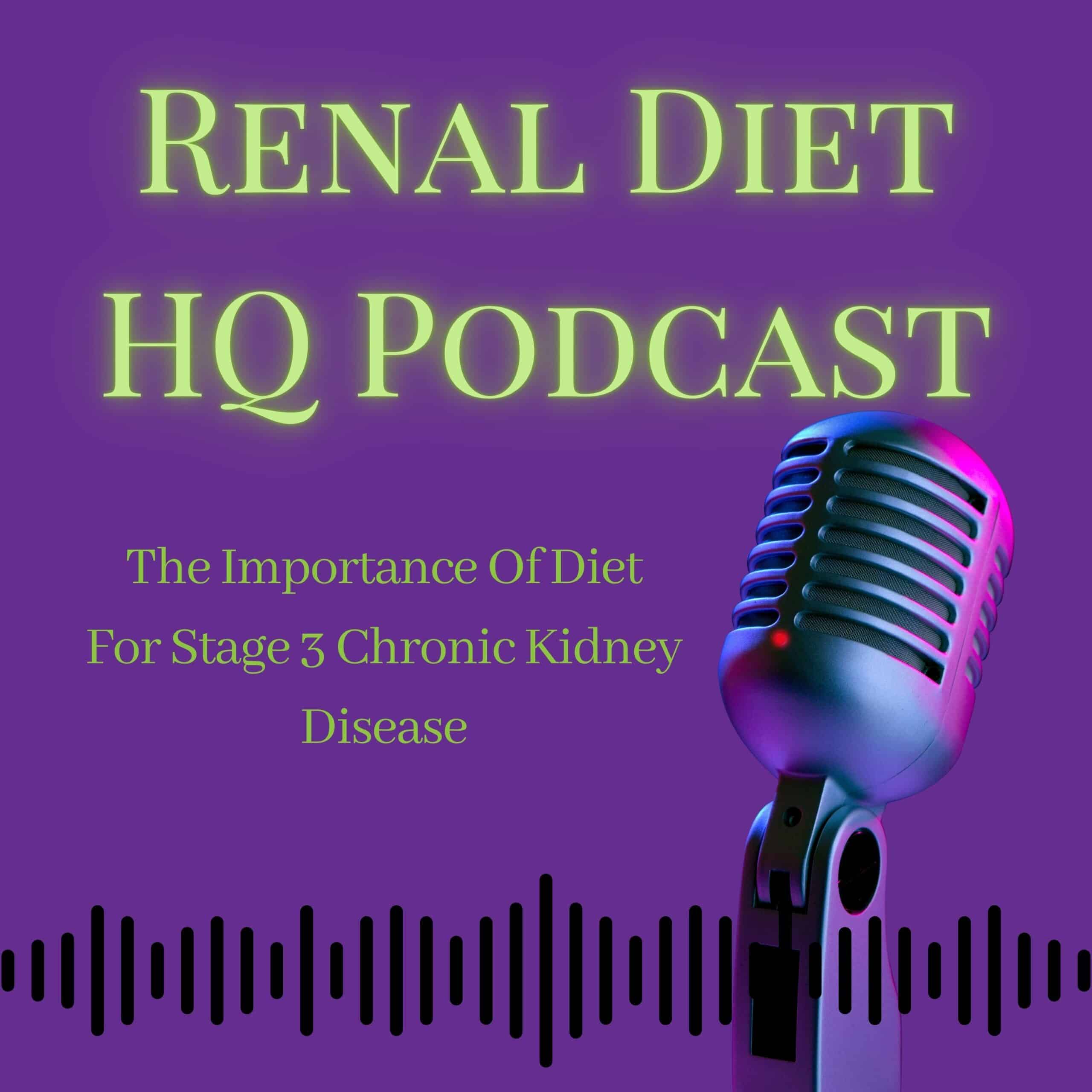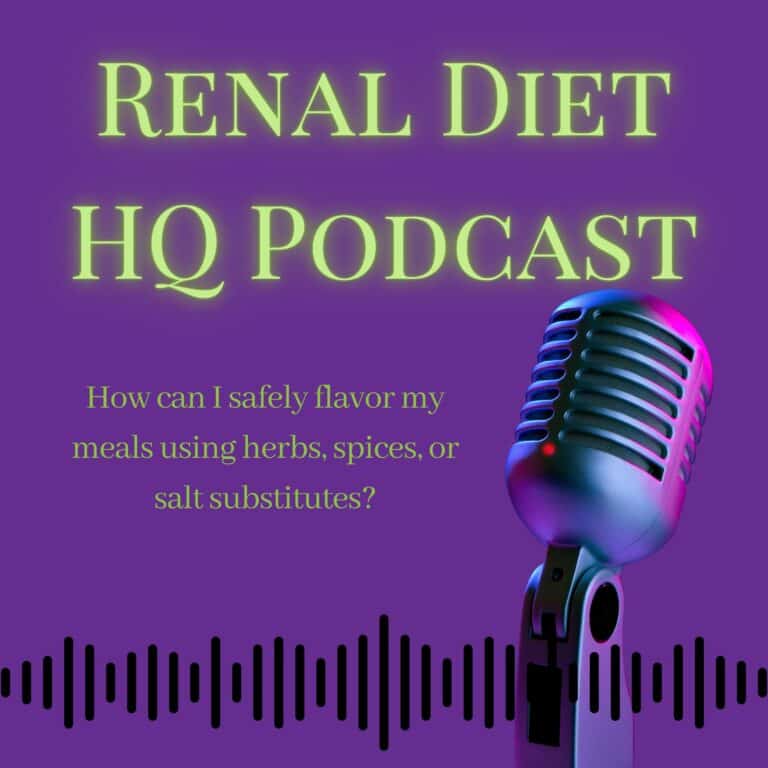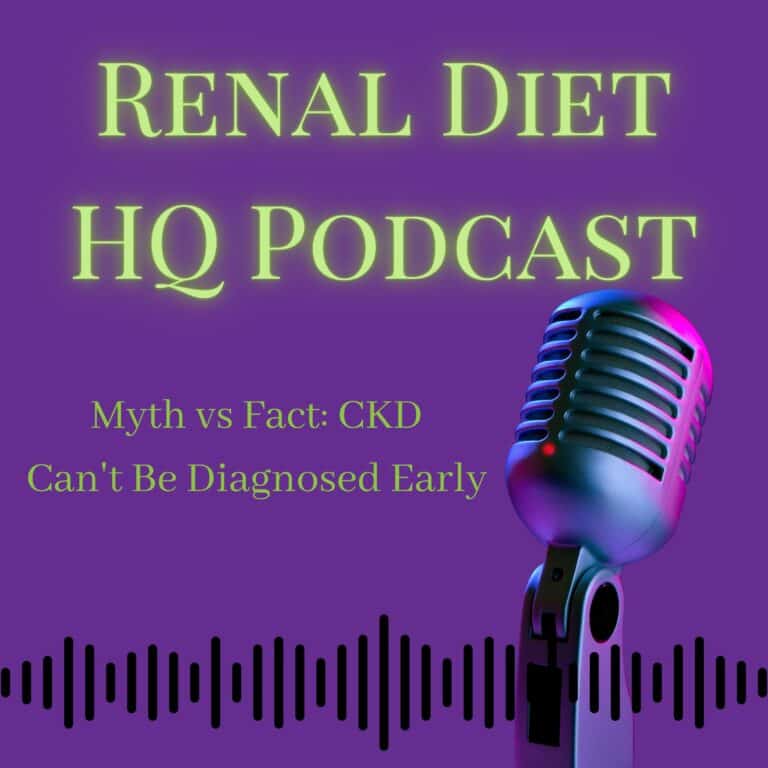The Importance Of Diet For Stage 3 Chronic Kidney Disease-Podcast
Podcast: Play in new window | Download

Chronic Kidney Disease (CKD) is a progressive condition that affects kidney function over time. When CKD reaches Stage 3, kidney function is moderately reduced, and diet plays a crucial role in slowing disease progression. By making informed food choices, individuals with Stage 3 CKD can manage symptoms, maintain overall health, and potentially delay the need for dialysis.
For More Recipes and Ideas --->> Get Your Free Meals and Recipes That Are Perfect for Pre-Dialysis Diets, Pre-Dialysis with Diabetes, or Dialysis Diets.
In this post, we’ll explore why diet is so important for Stage 3 CKD, key dietary guidelines, and practical tips for meal planning.
Understanding Stage 3 CKD
Stage 3 CKD is categorized by a moderate decline in kidney function, with an estimated glomerular filtration rate (eGFR) between 30 and 59 mL/min. At this stage, the kidneys are still working but are not as efficient at filtering waste and excess fluids. Common symptoms include fatigue, swelling, and changes in urination patterns. While Stage 3 CKD does not usually require dialysis, managing it through lifestyle and dietary changes is essential to prevent further decline.
Key Dietary Considerations for Stage 3 CKD
1. Protein Intake
Protein is an essential nutrient, but excessive protein can put additional strain on the kidneys. Individuals with Stage 3 CKD should aim for a balanced protein intake, focusing on high-quality protein sources like lean meats, eggs, and plant-based proteins. Working with a dietitian can help determine the right amount of protein for your needs.
2. Sodium Reduction
Reducing sodium intake is crucial for controlling blood pressure and minimizing fluid retention, both of which are common concerns for CKD patients. To lower sodium intake:
- Choose fresh, whole foods over processed and packaged foods.
- Cook with herbs and spices instead of salt.
- Read nutrition labels and opt for “low-sodium” or “no salt added” products.
3. Potassium and Phosphorus Management
As kidney function declines, the body may struggle to balance potassium and phosphorus levels, which can lead to complications like heart issues and bone problems.
- Limit high-potassium foods such as bananas, oranges, potatoes, and tomatoes.
- Opt for lower-potassium alternatives like apples, berries, cauliflower, and rice.
- Reduce phosphorus intake by avoiding processed meats, sodas, and dairy-based foods, and choosing fresh, unprocessed options.
4. Fluid Intake
While staying hydrated is important, individuals with CKD may need to monitor their fluid intake, especially if experiencing swelling or fluid retention. Your healthcare provider can guide you on the appropriate amount of fluids based on your specific condition.
Foods to Include in a Kidney-Friendly Diet
A well-balanced CKD diet should include:
- Lean proteins like chicken, fish, eggs, and plant-based sources.
- Low-potassium fruits and vegetables such as apples, berries, green beans, and zucchini.
- Whole grains like white rice, couscous, and oats (in moderation).
- Healthy fats including olive oil, avocado (in small amounts), and unsalted nuts.
Foods to Avoid with Stage 3 CKD
To protect kidney function, limit or avoid:
- High-sodium foods: Canned soups, processed snacks, and fast food.
- High-potassium foods: Bananas, oranges, tomatoes, and potatoes.
- High-phosphorus foods: Dairy products, dark sodas, and processed meats.
- Excessive protein: Large portions of red meat and high-protein diets.
Tips for Meal Planning and Cooking
- Plan meals ahead of time to ensure a balanced and kidney-friendly diet.
- Use fresh ingredients to control sodium and phosphorus levels.
- Try simple swaps, such as using herbs instead of salt or choosing white bread over whole wheat if potassium intake needs to be limited.
- Cook at home more often to have better control over ingredients and portions.
Diet plays a significant role in managing Stage 3 CKD and preventing further kidney damage. By focusing on balanced nutrition, limiting sodium, potassium, and phosphorus, and consulting with a healthcare provider, individuals with CKD can improve their quality of life.
If you or a loved one has Stage 3 CKD, start making small, manageable dietary changes today. For more kidney-friendly nutrition tips, check out our additional resources and recipes!
Be sure to subscribe to our updates and check out more CKD-safe recipes and guidance at RenalDietHQ.com.
🎧 Want more details and tips? Listen to the full podcast episode here:
Learn more about What’s the difference between Peritoneal dialysis and Hemodialysis?-Podcast
Learn more about Can I still eat bananas if I have CKD?-Podcast
More Renal Diet HQ Podcast
- Can I Eat Quinoa on a Renal Diet? | Kidney-Friendly Food Tips-Podcast
- Which Drinks Are SAFE for a Renal Diet? The Answers Might Surprise You!-Podcast
- What BBQ Foods Are Kidney-Friendly? Let’s Break It Down!-Podcast
- What do I need to know about Adjusting my Medications as Kidney Function Changes-Podcast








